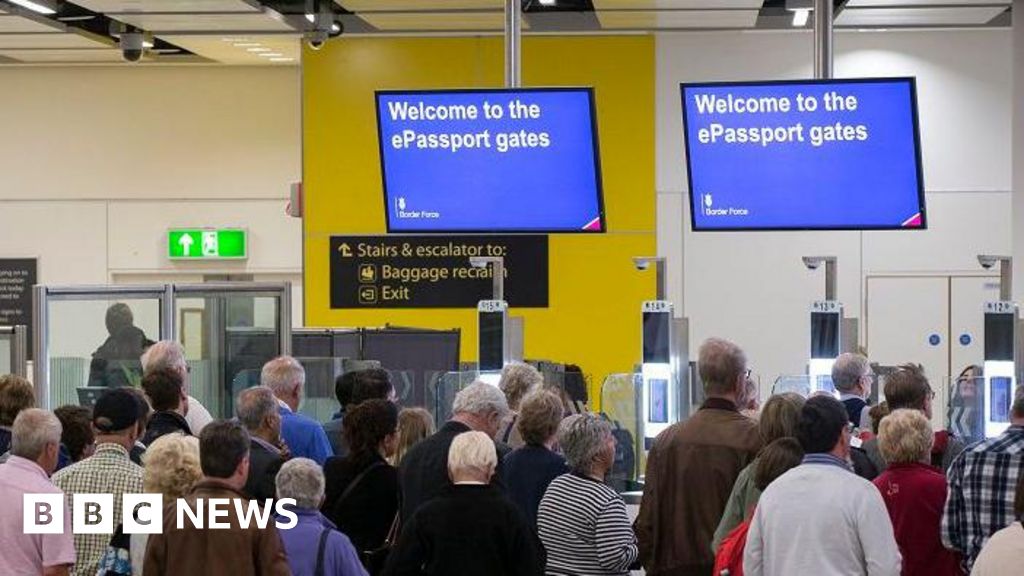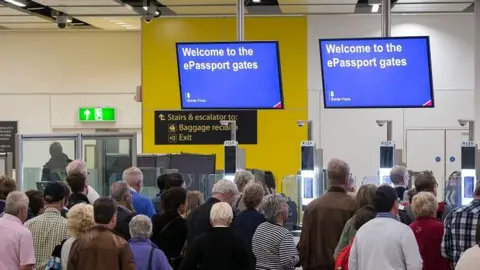British holidaymakers face €7 EU visa waiver next summer

- by Admin
- August 20, 2024

 Getty Images
Getty ImagesThe EU is planning to introduce its €7 EU visa waiver for British holidaymakers by next summer.
The scheme, which the EU confirms on its website will start “in the first half of 2025”, will cover people from more than 60 non-EU countries including the UK.
In comments first reported by the Times, EU home affairs commissioner Ylva Johansson suggested the visa waiver may be in place by the May half-term holiday in 2025.
She was speaking as she confirmed the Entry/Exit Scheme (EES) – which will require non-EU travellers to register fingerprints and a photo instead of having their passport stamped – will start on 10 November.
Under the European Travel Information and Authorisation System (ETIAS), passengers must apply for a waiver, similar to the US ESTA, before travel, and this will be valid for three years or until their passport expires, whichever is first.
It will cover travel to the Schengen Area, which includes every EU state except for Ireland and Cyprus, as well as Iceland, Liechtenstein, Norway and Switzerland.
A Home Office spokesperson said it expects the EU to provide more information on the rollout of the scheme “in due course”.
The update comes as the EU launched its much-anticipated EES scheme, after a series of delays.
In a statement, Ms Johansson said: “After intense dialogues with Member States, with you, with the different stakeholders – I have decided that the Entry/Exit System will enter into operations on 10 November.”
She said the ETIAS visa scheme would launch six months later, according to the Times.
Ms Johansson said the EES system would mean “every single airport”, “harbour” or “road into Europe” would have strict digital border controls.
More than 700 million tourists entered Europe last year, she said, and the new systems would help Europeans “sleep safer”.
The rules would mean “we will know if people stay too long” and it “will make it harder for criminals, terrorists or Russian spies to use fake passports”, she added.
What is the EES scheme?
Under the EES scheme, people entering the EU will have to register fingerprints, a photo and passport details.
That initial registration will be valid for three years, during which time it must be validated every time someone crosses the border. This will replace passport-stamping.
However, long queues have been predicted, with experts warning it could add at least two minutes processing time per passenger, compared with the current 45 seconds.
Juxtaposed border controls mean French border police check passports as people leave the UK to cross the Channel from Dover, London St Pancras and Folkestone.
What is the ETIAS scheme?
Anyone from a non-EU country currently has to apply for a visa – unless they are from a special list of 61 countries, which includes the US, Japan and Australia, as well as the UK.
People from these countries can travel within the EU’s Schengen zone – the area where people can travel without border checks – for up to 90 days without a visa.
However, because of the migrant crisis and security concerns over terrorism, the EU has decided to bring in more controls.
This has led to it introducing the ETIAS which, the EU Commission points out, is “way cheaper” than the $14 US ESTA.
The ETIAS will allow trips to the 27 EU member states, and Iceland, Liechtenstein, Norway and Switzerland.
An ETIAS will last for three years and allow an unlimited number of entries. The document will be checked by border guards when crossing the EU border.
The EU says the ETIAS system will “strengthen security checks on those persons who travel visa-free to the EU”.
What will UK holidaymakers have to do?
Passengers will need to apply online or via a mobile app. The form – which the EU describes as a “necessary and small procedural step” – will take no more than 10 minutes to complete.
The details needed for the application form will include passport information as well as background questions about criminal records or medical conditions.
More than 95% of applications will be approved automatically within minutes. However, some cases may take up to 72 hours, the EU warns.
Applications can also be denied or take up to four weeks to process in exceptional circumstances.
The fee will apply to anyone between the ages of 18 and 70, but the waiver will be free for children and the over-70s.
The Latest News
-
December 23, 2024Christmas shopping from a more civilised age! As Britain is gripped by festive getaway chaos and a looming recession, how the country used to get its last-minute purchases done in style
-
December 23, 2024On board with the pilots doing one of Britain’s toughest jobs
-
December 23, 2024Christmas Travel LIVE: Traffic chaos on motorways while flights cancelled
-
December 23, 2024UK economy stagnates as GDP figures revised down
-
December 23, 2024Donald Trump taps ‘Apprentice’ producer as special envoy to UK





